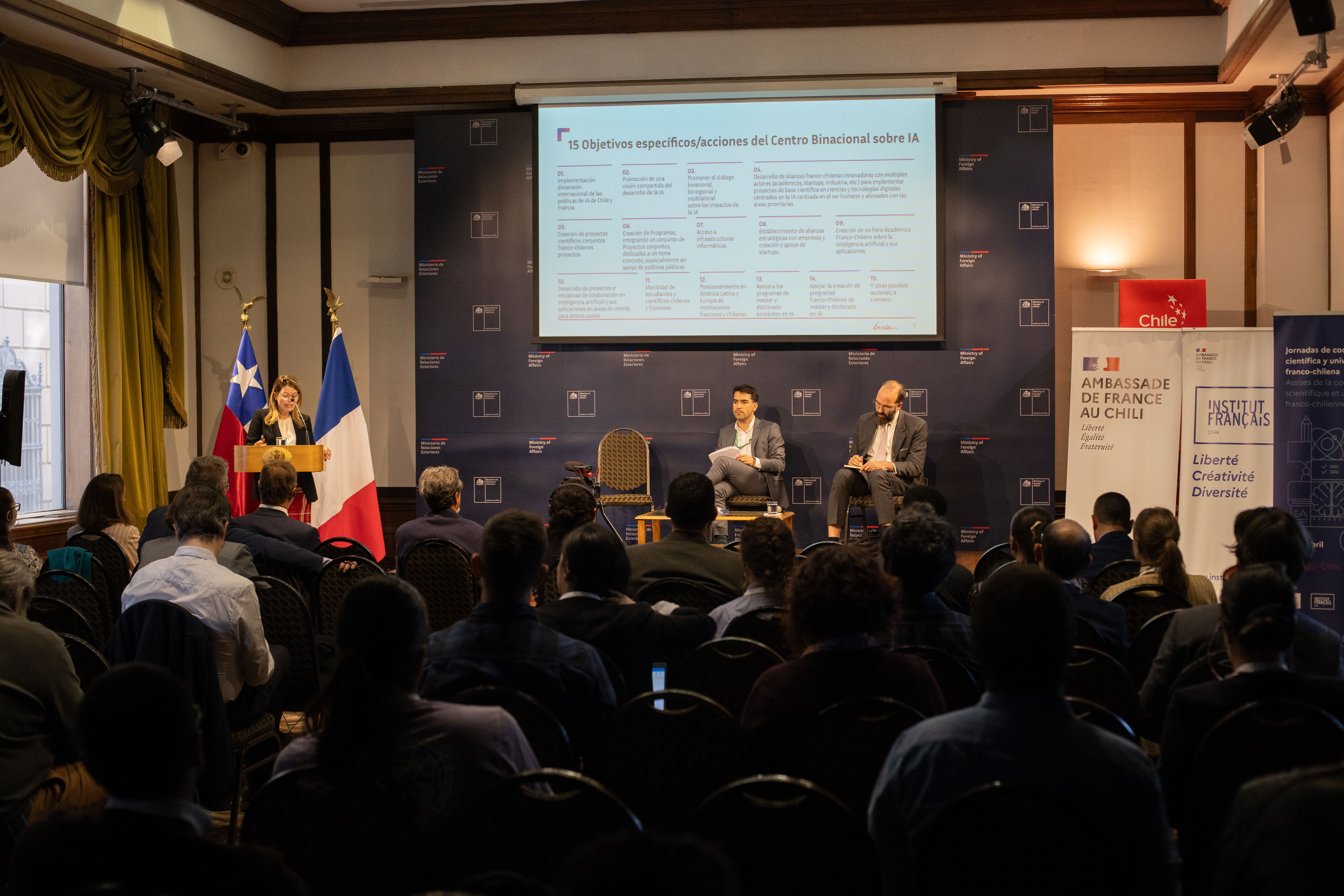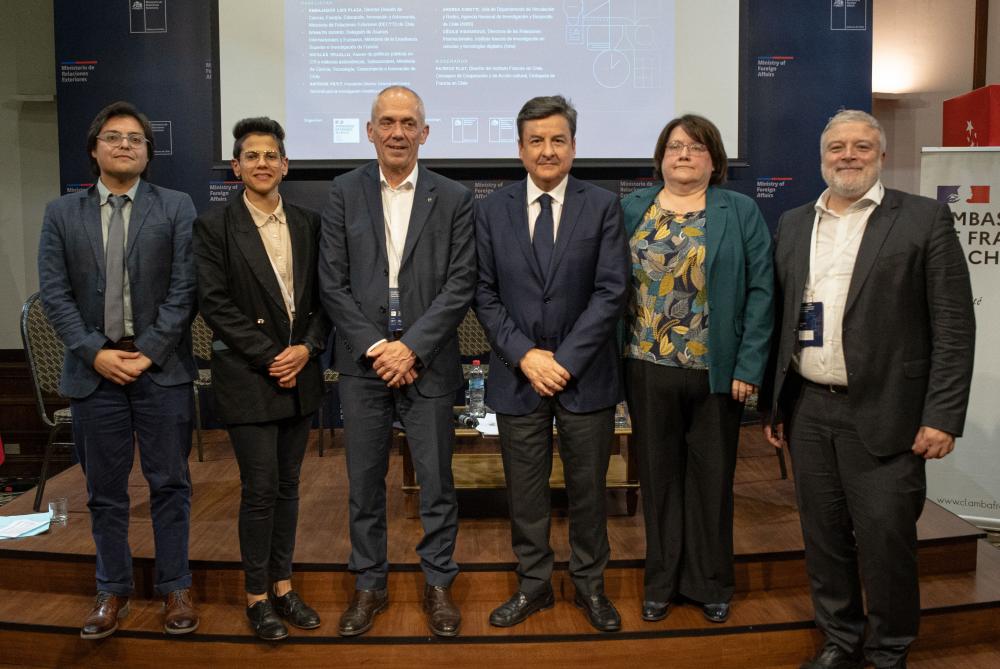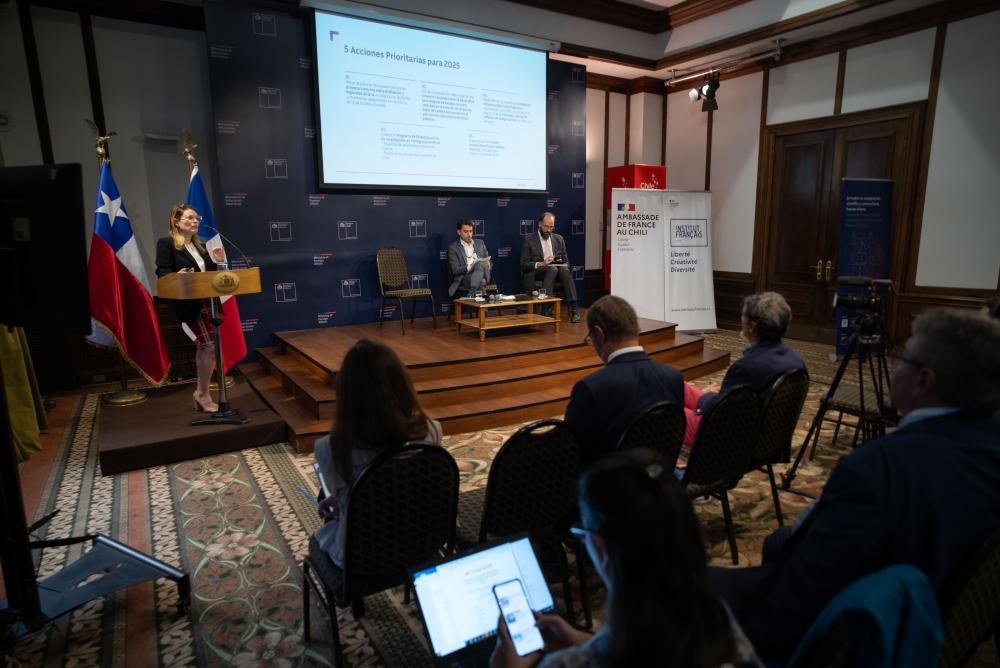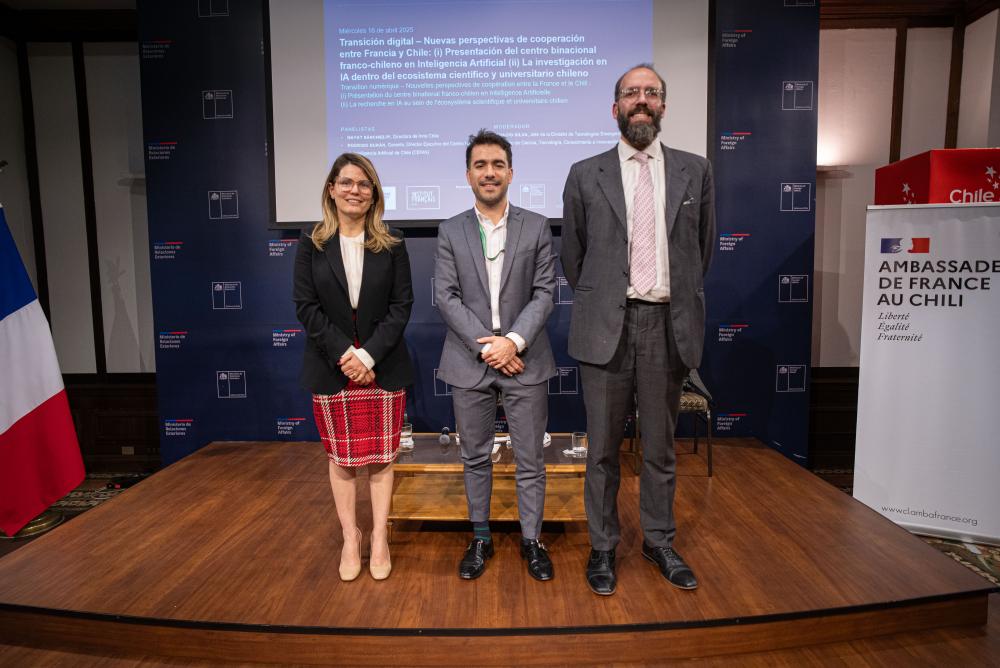- Representatives from Inria and Inria Chile were invited to speak on the unique role that Inria Chile plays in Franco-Chilean cooperation in digital sciences and technologies. They also presented the Franco-Chilean Binational Center for Artificial Intelligence and its priority actions, aimed at creating a significant impact on the development of AI in Latin America.

With the goal of strengthening the historic ties in higher education and research, the Franco-Chilean Scientific and University Cooperation Days were held at the headquarters of Chile’s Ministry of Foreign Affairs on April 15 and 16, 2025. The two day event brought together prominent experts and institutional representatives from both countries to address key topics such as scientific diplomacy, mobility programs for students and researchers, environmental, digital, and energy transitions, as well as bilateral projects and initiatives.
The event was organized by the French Embassy in Chile and the French Institute of Chile, in collaboration with the Chilean Ministry of Foreign Affairs, the Ministry of Science, Technology, Knowledge and Innovation, and CRUCH. Its aim was to highlight the relationship between Chile and France in research and scientific development, and its local impact, as well as its influence in Latin America and Europe.
During the event, Cécile Vigouroux, Director of International Relations at Inria and member of the French delegation to Chile, and Nayat Sánchez-Pi, Director of Inria Chile and of the Franco-Chilean Binational Center for AI, took part in both days of sessions. They presented on Inria’s contribution to the development of scientific cooperation between France and Chile throughout the institute’s more than 13 years in the country.
Inria Chile: 13 years fostering Franco-Chilean collaboration in digital sciences and technologies
In the panel titled "Scientific Diplomacy in Service of Global Challenges – Franco-Chilean Academic and Scientific Priorities", Cécile Vigouroux participated in a session moderated by Patrick Flot, Director of the French Institute of Chile and Counsellor for Cooperation and Cultural Action at the French Embassy in Chile. The panel also included Ambassador Luis Plaza, Director of the Division for Science, Energy, Education, Innovation and Astronomy (DECYTI) at the Chilean Ministry of Foreign Affairs; Donato Giorgi, Delegate for International and European Affairs at the French Ministry of Higher Education and Research; Nicolás Trujillo, Public Policy Advisor on STI and Astronomy to the Chilean Undersecretary for Ministry of Science, Technology, Knowledge and Innovation; Antoine Petit, CEO of the French National Centre for Scientific Research (CNRS); and Andrea Cibotti, Head of Outreach and Networks at the Chilean National Research and Development Agency (ANID).
Panelists reflected on the extensive and longstanding scientific diplomacy between Chile and France, which has enabled decades of knowledge exchange. They discussed how this relationship has been strengthened through joint initiatives ranging from academic collaboration to significant advances in strategic areas such as digital sciences and technologies, artificial intelligence, astronomy, health, agroecology, energy, and social sciences, among others.
In her remarks, Cécile Vigouroux emphasized Inria’s role in France and its projection in Chile, where since 2012 it has had its only center outside of France. She highlighted several projects and initiatives developed over the past 13 years that have driven Franco-Chilean cooperation in digital sciences and technologies, fostered academic and industrial partnerships, and provided unprecedented momentum for bilateral collaboration in artificial intelligence through the creation of the new Franco-Chilean Binational Center for AI.
Franco-Chilean cooperation in AI: Inria Chile’s initiatives to advance binational scientific and technological developmentce binational scientific and technological development
Nayat Sánchez-Pi, Director of Inria Chile and of the Franco-Chilean Binational Center for Artificial Intelligence, spoke at the panel “Digital Transition New Perspectives for Franco-Chilean Cooperation.” During her presentation, she introduced the Binational Center, its objectives, actions, and priorities, aimed at fostering the Franco-Chilean AI ecosystem and promoting the development of ethical, responsible, and trustworthy AI for the common good.
Sánchez-Pi outlined the Center’s 15 specific objectives, which focus on strengthening bilateral (France-Chile) and bi-regional (Europe-Latin America) cooperation, enhancing the Franco-Chilean research and innovation ecosystem, and supporting scientific collaboration between higher education and research institutions in both countries. She also presented the six priority pillars defined in the strategic agreement signed by the Chilean and French governments in November 2024:
- AI Evaluation
- Generative AI and Foundation Models
- AI for Science and Other Sciences for the Development of AI
- Frugal and Integrated AI
- AI and Innovation
- Support for AI Public Policies
Following her presentation, a panel discussion was held, moderated by Ignacio Silva, Head of the Emerging Technologies Division at the Chilean Ministry of Science, Technology, Knowledge and Innovation, and included Rodrigo Durán, CEO of the National Center for Artificial Intelligence (CENIA). The experts discussed the current landscape for AI development and use in Chile and Latin America, the contributions from academic and industry stakeholders, the importance of promoting responsible and impactful AI, and the value of bilateral cooperation between two regional leaders in this field: Chile and France.
Verbatim
Within this shared and strategic ambition, we aim to strengthen cooperation not only between France and Chile, but also between Europe and Latin America, serving as a bridge for digital sciences through AI. To achieve this, we will boost the research and innovation ecosystem for artificial intelligence and actively support scientific collaboration between Chilean and French higher education and research institutions. We have defined six priority goals that shape our vision, roadmap, and global challenges surrounding AI development. These six pillars address global AI trends but are focused on critical issues with direct societal impact.
Director of Inria Chile and the Franco-Chilean Binational Center for AI



